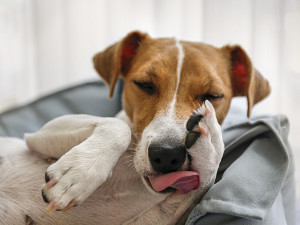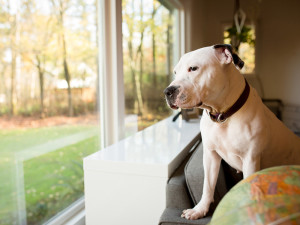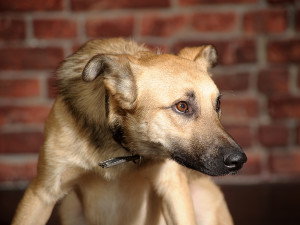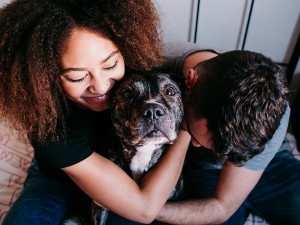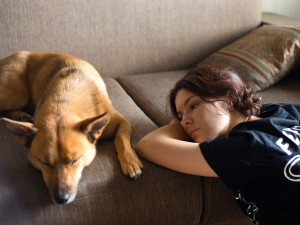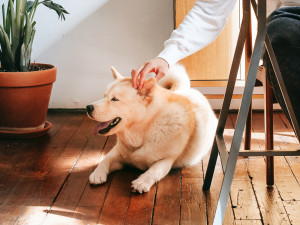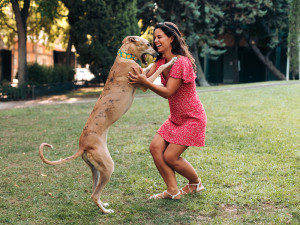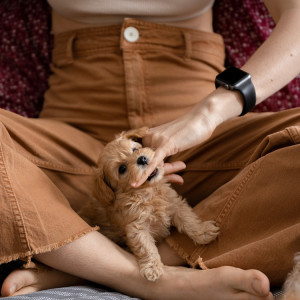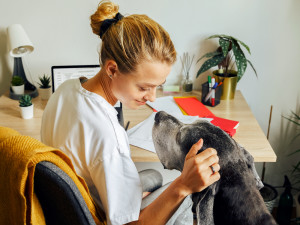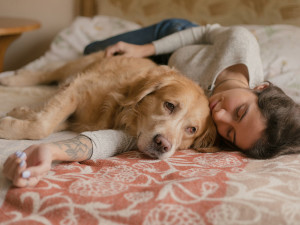Why Does My Dog Lick Me? The Meaning Behind Dogs Licking Us
The sentiment is nice, but...
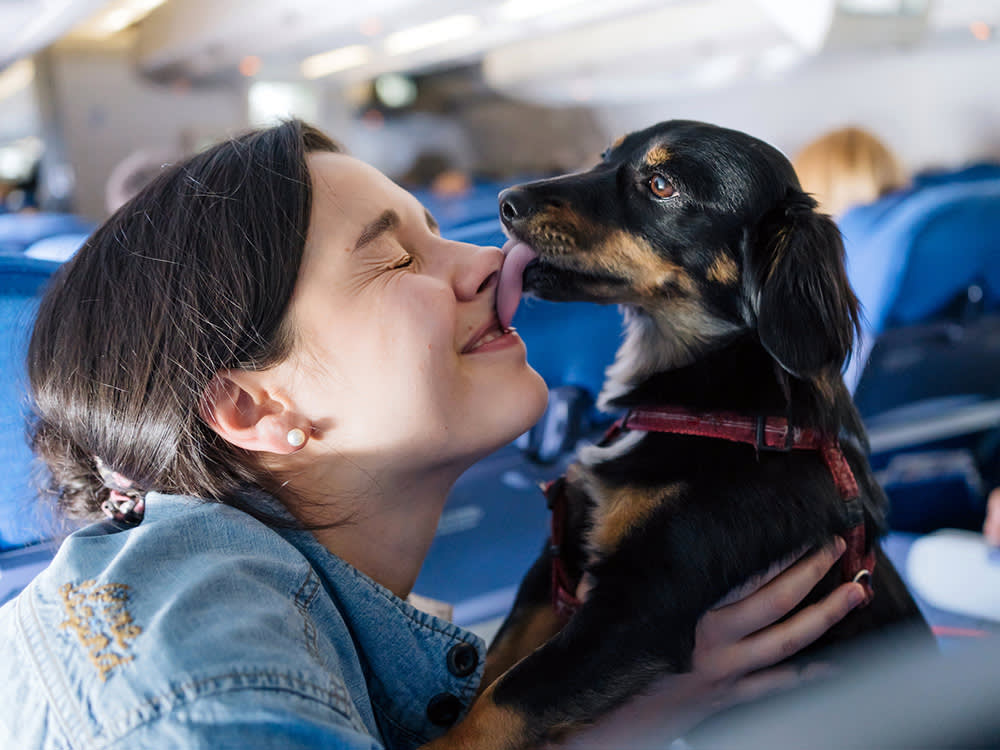
share article

Your pet wants you to read our newsletter. (Then give them a treat.)
A slobbery tongue to the face can be a jarring way to wake up — even when the cutest pup in the world is on the giving end. This might leave you wondering, “Why does my dog lick me so much?” It turns out that dogs lick humans for all sorts of reasons, beyond just trying to butter you up for treats. One of those reasons is to show affection.
Nevertheless, not all instances of licking should be encouraged; there are also times when licking behavior in dogs might signal discomfort or become a behavioral concern. Let’s explore all the reasons why dogs lick us. We’ll also provide helpful tips for establishing personal spaceopens in a new tab.
What does it mean when my dog licks me?
Domesticated dogs have been our besties for ages, but they still retain some of their wild instincts, including licking. Licking is an innate behavior that dogs learn during puppyhood, says Dr. Stefanie Schwartz, a board-certified veterinary behaviorist and founder of Civilized Petopens in a new tab. It plays an important role in dog-to-dog communication, and it can also give us humans clues about what our dogs need and how they’re feeling.
So what does it mean when a dog licks you, and how do you get them to stop when it gets to be too much? We spoke with Dr. Schwartz and other experts to understand this common canine behavior.
Affection: Dogs lick as a way to show affection and love.
Puppies are lavished with licks from their very first days. It’s how their moms bond with them, nurture and stimulate them. Because “dogs are affectionate and social creatures,” Dr. Schwartz says it’s only natural for adult dogs to express affection for their people in a similar way.
Whether it’s puppy kisses or a cuddle on the couch, Dr. Schwartz says it’s important to allow those close interactions while maintaining healthy boundaries. In fact, studies have shown that sharing bonding moments between dogs and humans can lower cortisol levelsopens in a new tab — aka stress levels — in both humans and dogs.
Grooming: Dogs lick their parents as a way to groom them, just as their mothers groomed them as puppies.
Another form of affection, dogs lick their favorite people as a way to groom them, just as they lick and groom each other.. This behavior is called allogroomingopens in a new tab, and it’s a way for dogs to show affection, build trust, and maintain social bonds.
Attention: Dogs may lick people to get attention.
A dog who is constantly trying to lick you while you’re busy with another task (like reading this article) might feel left out. Licking as a means of attention-seeking is a behavior that can easily become reinforced, cautionsDr. Rachel Malamedopens in a new tab, a veterinary behavioral specialist.
It’s near impossible to ignore a dog soaking you in slobber (more on how to redirect their behavior below). But if they receive the desired pets, they’ll likely continue licking you — and possibly more frequently.
Boredom: Dogs may lick people if they are bored or anxious.
Many dogs will excessively lick themselvesopens in a new tab, you, or other objects out of boredom. While any pup can become bored without the appropriate amount of exerciseopens in a new tab or stimulation, working breeds such as German Shepherds, German Shorthaired Pointers, Golden Retrievers, Great Danes, Irish Setters, Labrador Retrievers, and Pointers are most likely to find other, more destructive, activitiesopens in a new tab to do when they’re understimulated.
Saying “hello”: Dogs may lick to greet others.
Dogs lick each other and us to say “Hello!” It’s a greeting observed in ancestral wolves that our dogs still do today, saysJen Gumasopens in a new tab, a certified professional dog trainer and founder ofWiggles and Woofs Dog Training & Pet Careopens in a new tab.
“Wolves returning to the group often lick other wolves as a greeting,” Gumas explains. “Sometimes licking the inside of the other wolves’ mouthsopens in a new tab to gather information.” That’s why dogs tend to lick your face — or attempt for the mouth. In addition, licking is done by the submissive animal in the dynamic.
Medical reasons: In some cases, licking can be a sign of a medical condition, such as anxiety or allergies.
While licking is typically a normal behavior, it’s important to recognize when a behavior could signal poor health. If your dog doesn’t just lick your face but islicking odd surfacesopens in a new tab such as floors, walls, carpet, and furniture, they could have a medical condition such as an underlying gastrointestinal issue.
If you catch your dog constantly licking surfaces, Dr. Schwartz says compulsive disorders could be at play. Compulsive disorders occur out of context and may become so troublesome that they interfere with your pup’s normal grooming, eating, sleeping, and play activities. Dogs also lick the air when they feel nauseated, Dr. Schwartz adds.
Consulting behavioral veterinarians like Dr. Malamed and Dr. Schwartz is the recommended route for diagnosing and treating compulsive disorders in dogsopens in a new tab.
You taste good: Sometimes, there’s something on your skin that tastes good.
Dogs may enjoy licking our salty skin, particularly in areas with lots of sweat glands like our feet. They might also pick up traces of the food we’re eating or aromas from our meals. Other times, Gumas says, they just want to taste us to figure out where we’ve been.
How do I know if my dog is licking me out of affection?
Does your dog like to lick you as soon as you come home? Cuddle up and lay a wet one on you? What about a puppy kiss as soon as you wake up? Those are all out of affection, Gumas says. Schwartz adds that this is also a submissive greeting. Considering the context of the situation is key to understanding the meaning behind your dog’s slobbery signals.
Can licking be a sign of stress or anxiety in dogs?
“Some dogs tend to lick more when they are nervous,” Gumas says. “Licking can be a way that dogs show another dog that they are not a threat, and sometimes they do this with humans too.”
There’s also a theory called “kiss to dismissopens in a new tab.” According to the theory, when uncomfortable with something you’re doing, dogs lick as a polite way to request that you stop doing that. For instance, your pup might lick your hand when trimming their nails.
Dr. Malamed suggests pups licking the air outside of a positive interaction may express conflict, frustration, anxietyopens in a new tab, or stress. Either way, paying attention to body language is keyopens in a new tab. “If a dog is licking you and there are other body language signs that they may be uncomfortable such as a tense body or face, a tucked tail, or a lowered body, it’s best to give your dog some space,” Gumas says.
Can licking transmit diseases from dogs to humans?
As much as we hate to admit it, dogs’ mouths (like all animals’ mouths) are a breeding ground for bacteriaopens in a new tab. For most people, being licked by a dog — even near or on the mouth — isn’t a big deal. However, for those who are immunocompromised or have other health conditions that make them vulnerable to infections, it’s a good idea to discourage licking.
How can I prevent my dog from licking me excessively?
If you’d rather a pup not lick you — that’s OK! Just be mindful of how you discourage the behavior, our experts say. “Punishment can make a nervous dog even more anxious, which ironically can lead to even more licking,” Gumas says. Instead of reprimanding them for their loving behavior, try one of the following strategies:
Redirect the licking: Redirect their attention to something else, such as a toy or a game.
Ignore the licking: If your dog is licking you for attention, try to ignore them. This may be difficult at first, but eventually, your dog will learn that licking will not get them the attention they want.
Teach your dog a “leave it” command: This command can help teach your dog to stop licking as well as other unwanted behaviors.
If the licking is excessive or if you are concerned about a medical cause, see your veterinarian.
Dr. Schwartz adds that there are plenty of other ways to show your dog affection, such as speaking to them softly, feeding them complete and balanced meals on a schedule, grooming them, and providing them with plenty of play and exercise.
Should I be concerned if my dog suddenly starts licking excessively?
If you notice your dog suddenly starts licking excessively, it’s best to consult with your veterinarian. “Repetitive licking can be a sign of numerous conditions ranging from pain to anxiety to allergies,” Gumas says.
Gumas emphasizes not punishing dogs for excessive licking. Dogs who tend to lick their humans excessively are often experiencing anxiety, she says. While some people may dislike their dogs licking them and punish them for it, it can totally backfire. Punishment can make an anxious dog even more anxious, which can lead to even more licking.
Dogs lick for a variety of reasons, including affection, grooming, attention-seeking, boredom, stress, and medical conditions. If you’re not comfortable with your dog licking you, there are a few things you can do to discourage the behavior, such as redirecting their attention, ignoring them, or teaching them a “leave it” command. However, it’s important to be patient and consistent with your training, and to avoid punishing your dog, as this can make the problem worse.
If your dog’s licking is excessive or if you’re concerned about a medical cause, it's best to consult with your veterinarian.

Janelle Leeson
Janelle Leeson is a Portland, Oregon-based freelance writer. Her work has been featured in magazines such as Inside Your Dog’s Mind, Inside Your Cat’s Mind, and Paw Print, as well online at Insider Reviews, NBC Select, Shop Today, PetMD, and Daily Paws. She has two adventure cats, a flock of urban chickens, and a soon-to-be-husband who doesn’t mind housing the occasional foster cat — or five.
Related articles
- opens in a new tab
Will My New Dog Ever Love Me?
What to do when you don’t feel the close bond you want.
![Unrecognizable man sitting at desk petting his dog]() opens in a new tab
opens in a new tabHow to Pet a Dog — Yes, You Do Need Lessons
There’s a difference between being affectionate and being annoying.
![Portrait of a woman playing and having fun in the park with her big pet, a greyhound dog.]() opens in a new tab
opens in a new tabHow’s Your Dog Feeling? Check Their Tail
If your dog’s tail is wagging “to the left, to the left,” as Beyoncé says, it could mean they’re anxious.
![pet lover concept with mini dog on woman leg. sitting in room at home]() opens in a new tab
opens in a new tabWhat’s the Deal, Mouthy Puppies? Why Bite Inhibition Matters
How to teach your pup to play nice.
![Young woman sitting at desk petting her senior Great Dane]() opens in a new tab
opens in a new tabHow to Speak “Dog”
Lili Chin’s book Doggie Language illustrates how dogs communicate — beyond ear perks and tail wags.
- opens in a new tab
Does Your Dog Need Anti-Anxiety Meds?
How to cope with dog anxiety—from training to medication.

